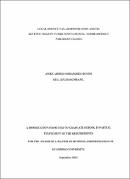Local service tax administration and its revenue yield in Yumbe town council- Yumbe district Northern Uganda
Abstract
This study was carried out to examine the effects of Local Service Tax Administration and its
Revenue yield in Yumbe Town Council. The specific objectives of the study were: 1- To analyze
the effect of Taxpayer education on LST Revenue yield in Yumbe Town Council, 2- To examine
the effect of Taxpayer Identification on LST revenue yield in Yumbe Town Council, and 3- To
assess the effect of LST payer assessment on LST revenue yield in Yumbe Town Council.
A Case Study research design was used in the study. The researcher employed case study design
because the phenomenon under investigation is still a contemporary one and the study is based
on real life situation.
A sample of 31 respondents was approached to fill the questionnaires, (politicians and technical
staff of the Town Council). The findings revealed the followings: LST payer education does not
have a statistically significant effect on LST revenue yield, with 15.7% variability explained,
LST payer identification does not have a statistically significant effect on LST revenue yield,
with 11% variability explained, and LST payer assessment does not have a significant effect on
LST revenue yield.
Conclusion: LST is one of the sources of LR facing a number of challenges which have kept its
growth below expectations in YTC. Although the setbacks originate mainly from insufficient
data on taxpayers, inadequate records to guide assessment, collection, and enforcement, it is that
YTC comes up with actions to enhance locally raised revenues as a strategic way of bridging the
service delivery gap with a full political will. The threshold is still high, resulting in exemptions
for a large number of persons, Assessment guidelines for commercial farmers not yet available,
and concealment of information by potential tax payers.

